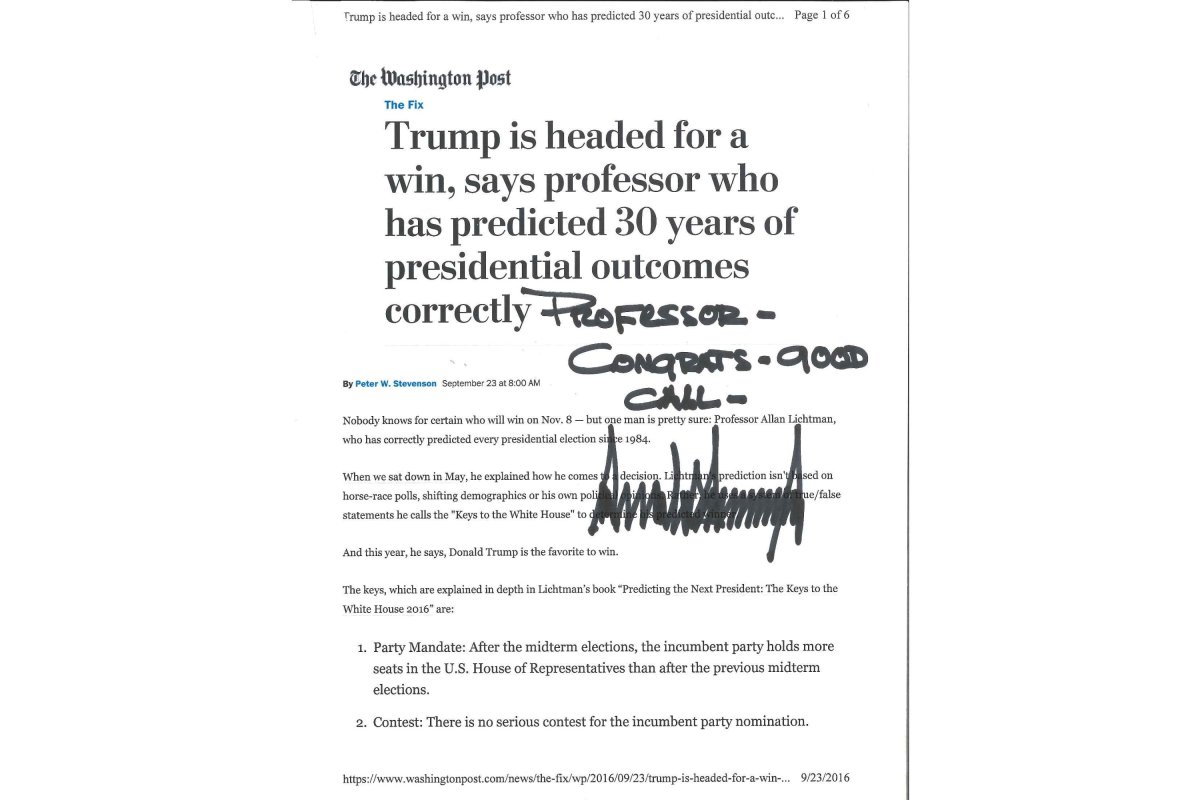Historian Allan Lichtman, known as the “Nostradamus” of U.S. elections for his impressive track record forecasting the outcomes, has hit back at criticism surrounding two of his previous predictions.
In a video posted to his YouTube channel on Wednesday, Lichtman said, “I want to talk about two criticisms that have arisen in recent years about the elections of 2000 and 2016,” saying his system “correctly predicted the outcome of those elections based on the intent of the voters.” Using his “Keys to the White House” model, Lichtman called the 2000 election for then-Vice President Al Gore, and the 2016 election for then-businessman and reality TV star Donald Trump.
Although Lichtman called the election for Gore, it was won by George W. Bush. Lichtman said this was not due to a fault in his model, but down to events in Florida: Bush won the state by roughly 500 votes after the Supreme Court halted a recount, securing enough Electoral College votes to pass the essential 270 to win. Gore however won the popular vote.
“The wrong person was elected president and it was essentially a stolen election,” Lichtman said.
Historian and American University professor Allan Lichtman answers questions during an interview with AFP in Bethesda, Maryland, on September 7, 2024. Lichtman created a model using 13 true/false criteria to predict whether the presidential candidate of the incumbent party will win or lose the next election.
Pedro Ugarte/AFP via Getty Images
The forecasting guru said his claims were backed up in a 2001 report to the United States Commission on Civil Rights.
“What the report showed is that overwhelmingly, disproportionately, Florida tossed out votes cast by 95 percent African American voters as compared to overwhelmingly white voters,” he said.
“What they tossed out was so-called overvotes,” the professor continued. “That is, for good reason, African Americans didn’t trust the system. After all, the governor [Jeb Bush] was the brother of the Republican candidate. So on those crazy punch cards, which were unreliable, they punched in Gore and then they wrote in Gore just to make absolutely sure no one could mistake their intentions.
“Florida threw out all those votes, despite the clear intentions of the voters.”
Lichtman said that based on those intentions, Al Gore should have won Florida, and the presidency.
“I would maintain that there’s a very good case that I did not miss that election and called it correctly,” the historian said.
A spokesman for the Florida Department of State didn’t immediately respond to a request for comment. The state’s secretary of state oversees elections.
Lichtman then turned to his 2016 prediction that Trump would defeat former Secretary of State Hillary Clinton.
He said the criticism that he only predicted Trump would win the popular vote, and not the Electoral College (Trump won the Electoral College but not the popular vote) was “based on a single, out of context sentence from a Social Education article that was completed before he made his final prediction.
“Those who site that quotation fail to put it in context, and fail to mention what I went on to say in that article, which was despite not tallying state by state electoral votes, the simple integral parameters that define ‘The Keys to the White House’ still predict the winners and losers of the election, and that I was confident in predicting that Donald Trump would be elected in 2016.”

A note sent from former President Donald Trump to Allan Lichtman, congratulating the professor for predicting a Trump victory in the 2016 presidential election. Lichtman hit back at critics of his 2000 and 2016 forecasts in a video posted to his YouTube channel on Wednesday.
Allan Lichtman/Newsweek
In an email to Newsweek on Thursday, Lichtman said he has been criticized for more than 40 years.
“I fully accept that as part of making predictions that will anger partisans and cut against the conventional wisdom.
“However, I have never experienced the level of hate that has been directed against me this year, with exceptionally vulgar, violent, and threatening attacks.
“I have also experienced this year an extraordinary deluge of pseudo-intellectual critiques from those who claim to know how to turn the keys better than me or who falsely reconstruct what I said in past predictions,” he said.
Lichtman’s system hinges on 13 keys, which evaluate the standing of the incumbent party based on a variety of factors, including the economy, foreign policy and domestic politics, including social unrest, major scandals and the presence of a major third-party candidate.
If six or more of the 13 keys—all true/false statements—are false, the incumbent party is predicted to lose the election. Should five or fewer be false, it is expected to win.
The 13 keys, as set out by the historian in a 2012 article for the Social Education journal, are these:
- Party mandate: After the midterm elections, the incumbent party holds more seats in the U.S. House of Representatives than after the previous midterm elections.
- No primary contest: There is no serious contest for the incumbent party nomination.
- Incumbent seeking reelection: The incumbent party candidate is the sitting president.
- No third party: There is no significant third party or independent campaign.
- Strong short-term economy: The economy is not in recession during the election campaign.
- Strong long-term economy: Real per capita economic growth during the term equals or exceeds mean growth during the previous two terms.
- Major policy change: The incumbent administration effects major changes in national policy.
- No social unrest: There is no sustained social unrest during the term.
- No scandal: The incumbent administration is untainted by major scandal.
- No foreign or military failure: The incumbent administration suffers no major failure in foreign or military affairs.
- Major foreign or military success: The incumbent administration achieves a major success in foreign or military affairs.
- Charismatic incumbent: The incumbent party candidate is charismatic or a national hero.
- Uncharismatic challenger: The challenging party candidate is not charismatic or a national hero.
Lichtman has formally predicated that Vice President Kamala Harris will win the 2024 presidential election, based on this forecast model.
Newsweek previously analyzed the reliability of the model by speaking to political scientists and critics who said it was “prone to bias and subjectivity.”
Do you have a story we should be covering? Do you have any questions about this article or the 2024 presidential election? Contact LiveNews@newsweek.com


